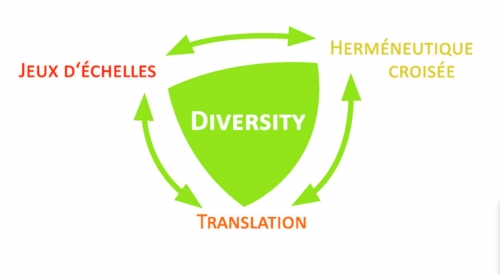Concepts clés de la recherche
Notre programme de recherche est basé sur trois outils analytiques de base : la traduction (conceptuelle et culturelle), l’herméneutique croisée et les jeux d’échelles.Traduction
En suivant les débats conceptuels contemporains en communication et traduction, comme en sociologie et en histoire, l’IRTG se sert de la traduction comme catégorie d’action sociale ou pratique sociale qui structure les espaces de la diversité. Le point focal des processus de médiation et de traduction introduit ainsi de nouvelles perspectives méthodologiques en ce qui concerne les recherches inter et transculturelles, ainsi que celles consacrées aux aires culturelles. L’IRTG enrichit le concept de traduction en puisant dans l’étude des médias et en explorant les divers médias en tant qu’agent dans les processus de médiation et de traduction. À travers ceux-ci, la diversité est formellement et esthétiquement transposée en sphères publiques multidimensionnelles qui produisent et reproduisent, altèrent, déconstruisent ou radicalisent le répertoire sémantique comme le savoir historique d’un contexte spécifique. En ce sens, nous introduisons une nouvelle approche à l’histoire de la mémoire et l’analyse de la politique des mémoires en appliquant une approche centrée sur la traduction afin d’aborder des phénomènes d’inter-temporalités et la médiation des diverses couches d’expérience historique.
Herméneutique Croisée
La structure international de notre programme de recherche introduit une méthodologie comparative innovante basée sur un principe épistémologique distinct que nous qualifions d’« herméneutique croisée ». Presque chaque membre du groupe d’experts participant au programme de recherche de l’IRTG a des expériences personnelles de la vie quotidienne au Canada et en Allemagne. Le groupe de Chercheurs Participants se constitue de chercheurs de l’Allemagne et du Canada qui sont des experts des études québécoises et canadiennes ou des études européennes (notamment françaises et allemandes). En puisant dans des perspectives disciplinaires différentes, les intérêts académiques pour la diversité des deux groupes se construisent à travers leur expérience quotidienne de leurs contextes : que ce soit la métropole montréalaise multilingue ou la zone frontière du « Saar-Lor-Lux », une région européenne historiquement et politiquement distincte dans sa manière de gérer les questions des minorités langagières, des problèmes de dé- et reterritorialisation et des réseaux de familles transfrontaliers, etc.
Jeux d’échelles
Les projets de recherche dans lesquels sont engagés les membres de l’IRTG sont basés sur une multiplicité d’approches théoriques et méthodologiques et de paradigmes de recherche. Nous adoptons le jeu d’échelle en mobilisant à la fois les perspectives analytiques micro et macro, mais également à travers une mobilité empirique qui ne cesse de se mouvoir entre Montréal-Québec-Canada et la région SaarLorLux, Allemagne-France et Europe. Nous abordons ces zones comme étant des configurations spatiales multidimensionnelles, concrètes et symboliques où des processus micro- et macrosociaux sont inter-reliés et travaillent ensemble sur divers plans temporels. Il ne s’agit donc pas seulement de zones locales-régionales-nationales et transnationales ou urbaines-rurales, mais également publiques-privées, formelles-informelles, légitimes-illégitimes, actuelles-remémorées-oubliées, etc.










